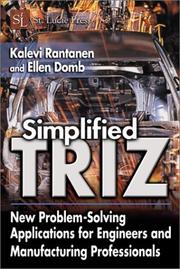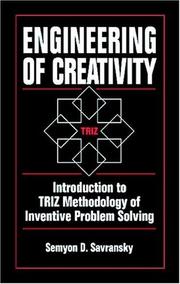| Listing 1 - 10 of 12 | << page >> |
Sort by
|
Book
ISBN: 8884532205 8884532213 Year: 2004 Publisher: Firenze : Firenze university press,
Abstract | Keywords | Export | Availability | Bookmark
 Loading...
Loading...Choose an application
- Reference Manager
- EndNote
- RefWorks (Direct export to RefWorks)
TRIZ the Theory of Inventive Problem Solving is a living science and a practical methodology: millions of patents have been examined to look for principles of innovation and patterns of excellence. Large and small companies are using TRIZ to solve problems and to develop strategies for future technologies. The TRIZ Future Conference is the annual meeting of the European TRIZ Association, with contributions from everywhere in the world. The aims of the 2004 edition are the integration of TRIZ with other methodologies and the dissemination of systematic innovation practices even through SMEs: a broad spectrum of subjects in several fields debated with experts, practitioners and TRIZ newcomers.
Inventions --- Creative thinking --- Technological innovations --- TRIZ theory --- Engineering & Applied Sciences --- Technology - General --- Inventor's problem solving, Theory of --- Teorii︠a︡ reshenii︠a︡ izobretatel'skikh zadach --- Theory of inventor's problem solving --- Theory of solving inventor's problems --- Creative ability in technology --- Prior art (Patent law) --- Research, Industrial --- Problem solving

ISBN: 1139931091 0511584237 0521826209 0511131372 Year: 2005 Publisher: Cambridge : Cambridge University Press,
Abstract | Keywords | Export | Availability | Bookmark
 Loading...
Loading...Choose an application
- Reference Manager
- EndNote
- RefWorks (Direct export to RefWorks)
This book describes a revolutionary methodology for enhancing technological innovation called TRIZ. The TRIZ methodology is increasingly being adopted by leading corporations around the world to enhance their competitive position. The authors explain how the TRIZ methodology harnesses creative principles extracted from thousands of successful patented inventions to help you find better, more innovative, solutions to your own design problems. You'll learn how to use TRIZ tools for conceptual development of novel technologies, products and manufacturing processes. In particular, you'll find out how to develop breakthrough, compromise-free design solutions and how to reliably identify next generation products and technologies. Whether you're trying to make a better beer can, find a new way to package microchips or reduce the number of parts in a lawnmower engine, this book can help. Written for practicing engineers, product managers, technology managers and engineering students.
New products. --- TRIZ theory. --- Inventor's problem solving, Theory of --- Teorii︠a︡ reshenii︠a︡ izobretatel'skikh zadach --- Theory of inventor's problem solving --- Theory of solving inventor's problems --- Problem solving --- New product development --- NPD (Marketing) --- Product development --- Products, New --- Commercial products --- Industrial design --- Engineering --- General and Others
Book
ISBN: 981161041X 9811610401 Year: 2021 Publisher: Gateway East, Singapore : Springer,
Abstract | Keywords | Export | Availability | Bookmark
 Loading...
Loading...Choose an application
- Reference Manager
- EndNote
- RefWorks (Direct export to RefWorks)
TRIZ theory. --- Technological innovations. --- Breakthroughs, Technological --- Innovations, Industrial --- Innovations, Technological --- Technical innovations --- Technological breakthroughs --- Technological change --- Creative ability in technology --- Inventions --- Domestication of technology --- Innovation relay centers --- Research, Industrial --- Technology transfer --- Inventor's problem solving, Theory of --- Teorii︠a︡ reshenii︠a︡ izobretatel'skikh zadach --- Theory of inventor's problem solving --- Theory of solving inventor's problems --- Problem solving

ISBN: 1574443232 Year: 2002 Publisher: Boca Raton St. Lucie
Abstract | Keywords | Export | Availability | Bookmark
 Loading...
Loading...Choose an application
- Reference Manager
- EndNote
- RefWorks (Direct export to RefWorks)
67.02 --- Manufacturing processes --- Creative thinking. --- Engineering --- Problem solving --- TRIZ theory. --- Technological innovations. --- Methodology. --- 67.02 Manufacturing processes --- Creative thinking --- Technological innovations --- TRIZ theory --- Inventor's problem solving, Theory of --- Teorii︠a︡ reshenii︠a︡ izobretatel'skikh zadach --- Theory of inventor's problem solving --- Theory of solving inventor's problems --- Breakthroughs, Technological --- Innovations, Industrial --- Innovations, Technological --- Technical innovations --- Technological breakthroughs --- Technological change --- Creative ability in technology --- Inventions --- Domestication of technology --- Innovation relay centers --- Research, Industrial --- Technology transfer --- Methodology --- Psychology --- Decision making --- Executive functions (Neuropsychology) --- Construction --- Industrial arts --- Technology --- Creative thinking (Education) --- Creative ability --- Thought and thinking
Book
ISBN: 813220736X 9786613945556 8132207378 1283633108 Year: 2012 Publisher: [New Delhi?] India : Springer,
Abstract | Keywords | Export | Availability | Bookmark
 Loading...
Loading...Choose an application
- Reference Manager
- EndNote
- RefWorks (Direct export to RefWorks)
The book is a valuable research tool-kit for innovators, amateur & professionals alike. Additionally, College & University faculties on Engineering, who organize yearly workshops internationally will find hundreds of novel themes to choose from. Some teachers might just secretly buy this book to introduce out-of-box brain-teasers in classroom to add fizz to normal (at times boring) lecturing. The book can be used as main/add-on textbook towards following courses: (1) Master's degree programs on design innovation worldwide and (2) Senior undergraduate courses in industrial, engineering & product design.
TRIZ theory. --- Enigineering --- Problem solving --- Creative thinking. --- Methodology. --- Inventor's problem solving, Theory of --- Teorii︠a︡ reshenii︠a︡ izobretatel'skikh zadach --- Theory of inventor's problem solving --- Theory of solving inventor's problems --- Engineering. --- Philosophy. --- Industrial design. --- Engineering design. --- Machinery. --- Engineering Design. --- Industrial Design. --- Machinery and Machine Elements. --- Philosophy of Technology. --- Creative thinking (Education) --- Creative ability --- Thought and thinking --- Methodology --- Psychology --- Decision making --- Executive functions (Neuropsychology) --- Architectural design. --- Mental philosophy --- Humanities --- Construction --- Industrial arts --- Technology --- Design --- Structural design --- Design, Engineering --- Engineering --- Industrial design --- Strains and stresses --- Machinery --- Machines --- Manufactures --- Power (Mechanics) --- Mechanical engineering --- Motors --- Power transmission --- Design, Industrial --- Mechanical drawing --- New products --- Curious devices
Book
ISBN: 3030042545 3030042537 Year: 2019 Publisher: Cham : Springer International Publishing : Imprint: Springer,
Abstract | Keywords | Export | Availability | Bookmark
 Loading...
Loading...Choose an application
- Reference Manager
- EndNote
- RefWorks (Direct export to RefWorks)
This introductory book describes the initial (first) level of studying the theory of inventive problem solving (TRIZ) from the series “TRIZ from A to Z,” and presents the most general methods for solving inventive problems and generating new ideas. Chapter 1 examines traditional technologies for problem solving, based on trial and error. Chapter 2 describes the general concept of TRIZ, while Chapter 3 explains the main notions of “system” approaches, like system thinking, system and its hierarchy, system effect, emergency, synergetic effect and systematicity. In turn, Chapter 4 describes the notion of “ideality” and Chapter 5 addresses the notion of resources, their types, and methods for using them. Chapter 6 acquaints readers with one of the most important aspects of TRIZ: contradiction. Chapter 7 describes the inventive principles, while Chapter 8 includes descriptions of the systems of trends proposed by G. Altshuller and the author. In closing, the author makes recommendations on how to most effectively use TRIZ tools, on how readers can improve their knowledge, skills and habits concerning the use of TRIZ, and on how they can hone their inventive thinking skills. The book also features Appendices that include analyses of selected problems, a list of the main websites related to TRIZ, and lists of examples, problems, illustrations, tables and formulae.
Engineering design. --- Industrial engineering. --- Management. --- Engineering Design. --- Industrial and Production Engineering. --- Innovation/Technology Management. --- Administration --- Industrial relations --- Organization --- Management engineering --- Simplification in industry --- Engineering --- Value analysis (Cost control) --- Design, Engineering --- Industrial design --- Strains and stresses --- Design --- TRIZ theory. --- Inventor's problem solving, Theory of --- Teorii︠a︡ reshenii︠a︡ izobretatel'skikh zadach --- Theory of inventor's problem solving --- Theory of solving inventor's problems --- Problem solving --- Production engineering. --- Industrial management. --- Business administration --- Business enterprises --- Business management --- Corporate management --- Corporations --- Industrial administration --- Management, Industrial --- Rationalization of industry --- Scientific management --- Management --- Business --- Industrial organization --- Manufacturing engineering --- Process engineering --- Industrial engineering --- Mechanical engineering

ISBN: 0849322553 Year: 2000 Publisher: Boca Raton, Fla CRC Press
Abstract | Keywords | Export | Availability | Bookmark
 Loading...
Loading...Choose an application
- Reference Manager
- EndNote
- RefWorks (Direct export to RefWorks)
Creative thinking --- Engineering --- Problem solving --- Technological innovations --- TRIZ theory --- 658.512.2 --- Breakthroughs, Technological --- Innovations, Industrial --- Innovations, Technological --- Technical innovations --- Technological breakthroughs --- Technological change --- Creative ability in technology --- Inventions --- Domestication of technology --- Innovation relay centers --- Research, Industrial --- Technology transfer --- Creative thinking (Education) --- Creative ability --- Thought and thinking --- 658.512.2 Designing. Shape, design, construction of products. Industrial design --- Designing. Shape, design, construction of products. Industrial design --- Inventor's problem solving, Theory of --- Teorii︠a︡ reshenii︠a︡ izobretatel'skikh zadach --- Theory of inventor's problem solving --- Theory of solving inventor's problems --- Methodology --- Psychology --- Decision making --- Executive functions (Neuropsychology) --- Construction --- Industrial arts --- Technology --- Planning (firm)
Book
ISBN: 1461437067 9786613767097 1461437075 1280995483 Year: 2012 Publisher: New York : Springer,
Abstract | Keywords | Export | Availability | Bookmark
 Loading...
Loading...Choose an application
- Reference Manager
- EndNote
- RefWorks (Direct export to RefWorks)
The TRIZ Inventive Problem Solving Process is a left-brained, highly creative method of problem solving which uses a basic algorithm developed through the study of millions of patents. Unlike psychological tools, which rely on sorting through hundreds of ideas in order to find the valuable few, TRIZ rigorously defines the problem and helps identify existing inventive principles that have helped solve other problems of the same class. It is also an invaluable aid for strategic business planning. The Ideal Result introduces the TRIZ Inventive Problem Solving Process in a way that allows readers to make immediate use of its most basic concepts. This book reviews the basic TRIZ algorithm tools, provides templates for analyzing your own difficult problems, and helps establish mental frameworks for finding your own solutions.
Nanotechnology. --- Pneumatics. --- Technological innovation. --- TRIZ theory --- Engineering & Applied Sciences --- Management --- Chemical & Materials Engineering --- Business & Economics --- Technology - General --- Management Theory --- Chemical Engineering --- TRIZ theory. --- Problem solving. --- Inventor's problem solving, Theory of --- Teorii︠a︡ reshenii︠a︡ izobretatel'skikh zadach --- Theory of inventor's problem solving --- Theory of solving inventor's problems --- Chemistry. --- Business. --- Management science. --- Chemical engineering. --- Mechanical engineering. --- Electrical engineering. --- Environmental engineering. --- Biotechnology. --- Industrial Chemistry/Chemical Engineering. --- Electrical Engineering. --- Mechanical Engineering. --- Business and Management, general. --- Environmental Engineering/Biotechnology. --- Methodology --- Psychology --- Decision making --- Executive functions (Neuropsychology) --- Problem solving --- Computer engineering. --- Chemical engineering --- Genetic engineering --- Trade --- Economics --- Commerce --- Industrial management --- Engineering, Mechanical --- Engineering --- Machinery --- Steam engineering --- Computers --- Chemistry, Industrial --- Engineering, Chemical --- Industrial chemistry --- Chemistry, Technical --- Metallurgy --- Design and construction --- Environmental control --- Environmental effects --- Environmental stresses --- Environmental health --- Environmental protection --- Pollution --- Sustainable engineering --- Quantitative business analysis --- Operations research --- Statistical decision --- Electric engineering
Book
ISBN: 3319565931 3319565923 Year: 2017 Publisher: Cham : Springer International Publishing : Imprint: Springer,
Abstract | Keywords | Export | Availability | Bookmark
 Loading...
Loading...Choose an application
- Reference Manager
- EndNote
- RefWorks (Direct export to RefWorks)
It has been two decades since the TRIZ theory originating in Russia spread across the world. Every continent adopted it in a different manner – sometimes by glorifying its potential and its perspectives (the American way); sometimes by viewing it with mistrust and suspicion (the European way); and sometimes by adopting it as-is, without questioning it further (the Asian way). However, none of these models of adoption truly succeeded. Today, an assessment of TRIZ practices in education, industry and research is necessary. TRIZ has expanded to many different scientific disciplines and has allowed young researchers to reexamine the state of research in their field. To this end, a call was sent out to all known francophone research laboratories producing regular research about TRIZ. Eleven of them agreed to send one or more of their postdoctoral researchers to present their work during a seminar, regardless of the maturity or completeness of their efforts. It was followed by this book project, presenting one chapter for every current thesis in order to reveal the breadth, the richness and the perspectives that research about the TRIZ theory could offer our society. The topics dealt with e.g. the development of new methods inspired by TRIZ, educational practices, and measuring team impact. The work presented here is generally intended for engineers, educators at all levels, industrialists, managers, researchers and political representatives. Offering a snapshot of various types of research conducted within the field of TRIZ in France, it represents a unique resource.
Computer science. --- Management. --- Industrial management. --- Software engineering. --- Computers. --- Engineering design. --- Computer Science. --- Models and Principles. --- Innovation/Technology Management. --- Engineering Design. --- Software Engineering. --- TRIZ theory --- Inventor's problem solving, Theory of --- Teorii︠a︡ reshenii︠a︡ izobretatel'skikh zadach --- Theory of inventor's problem solving --- Theory of solving inventor's problems --- Problem solving --- Design, Engineering --- Engineering --- Industrial design --- Strains and stresses --- Administration --- Industrial relations --- Organization --- Informatics --- Science --- Computer software engineering --- Design --- Business administration --- Business enterprises --- Business management --- Corporate management --- Corporations --- Industrial administration --- Management, Industrial --- Rationalization of industry --- Scientific management --- Management --- Business --- Industrial organization --- Automatic computers --- Automatic data processors --- Computer hardware --- Computing machines (Computers) --- Electronic brains --- Electronic calculating-machines --- Electronic computers --- Hardware, Computer --- Computer systems --- Cybernetics --- Machine theory --- Calculators --- Cyberspace
Book
ISBN: 3030612953 3030612945 Year: 2020 Publisher: Cham, Switzerland : Springer,
Abstract | Keywords | Export | Availability | Bookmark
 Loading...
Loading...Choose an application
- Reference Manager
- EndNote
- RefWorks (Direct export to RefWorks)
This book constitutes the refereed proceedings of the 20th International TRIZ Future Conference on Automated Invention for Smart Industries, TFC 2020, held in Cluj-Napoca, Romania, in October 2020 and sponsored by IFIP WG 5.4. The conference was held virtually. The 34 full papers presented were carefully reviewed and selected from 91 submissions. They are organized in the following thematic sections: computing TRIZ; education and pedagogy; sustainable development; tools and techniques of TRIZ for enhancing design; TRIZ and system engineering; TRIZ and complexity; and cross-fertilization of TRIZ for innovation management.
Artificial intelligence. --- Application software. --- Software engineering. --- Database management. --- Artificial Intelligence. --- Information Systems Applications (incl. Internet). --- Software Engineering. --- Computer Applications. --- Database Management. --- Data base management --- Data services (Database management) --- Database management services --- DBMS (Computer science) --- Generalized data management systems --- Services, Database management --- Systems, Database management --- Systems, Generalized database management --- Electronic data processing --- Computer software engineering --- Engineering --- Application computer programs --- Application computer software --- Applications software --- Apps (Computer software) --- Computer software --- AI (Artificial intelligence) --- Artificial thinking --- Electronic brains --- Intellectronics --- Intelligence, Artificial --- Intelligent machines --- Machine intelligence --- Thinking, Artificial --- Bionics --- Cognitive science --- Digital computer simulation --- Logic machines --- Machine theory --- Self-organizing systems --- Simulation methods --- Fifth generation computers --- Neural computers --- TRIZ theory --- Technological innovations --- Creative thinking --- Artificial intelligence --- Industrial applications --- Inventor's problem solving, Theory of --- Teorii︠a︡ reshenii︠a︡ izobretatel'skikh zadach --- Theory of inventor's problem solving --- Theory of solving inventor's problems --- Problem solving
| Listing 1 - 10 of 12 | << page >> |
Sort by
|

 Search
Search Feedback
Feedback About UniCat
About UniCat  Help
Help News
News